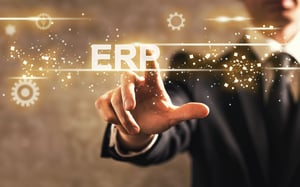Have you ever considered how businesses keep pace in the digital age? The answer lies in the evolution of Enterprise Resource Planning (ERP) systems. From their humble beginnings in the 1960s to the sophisticated, cloud-based solutions of today, ERP systems have been the backbone of business efficiency and innovation.
With the global ERP software market size valued at $50.57 billion in 2021 and expected to reach $123.41 billion by 2030, the importance of ERP systems in the digital transformation of businesses cannot be overstated.
Dive into the fascinating journey of ERP systems and discover how they've become indispensable in various industries.
The Origins of ERP (1960s - 1980s)
The journey of Enterprise Resource Planning (ERP) systems commenced in the 1960s with the inception of Material Requirements Planning (MRP). MRP was revolutionary, providing businesses with a way to manage manufacturing processes by efficiently planning inventory needs and production schedules.
As technology evolved and business requirements became more complex, MRP expanded into Manufacturing Resource Planning (MRP II) during the late 1970s and 1980s. This evolution marked a significant milestone in ERP history, introducing capabilities that integrated various aspects of manufacturing, including resource allocation and detailed scheduling.
The transition from MRP to MRP II laid the foundational stones of what would become the first ERP system, addressing both technological advancements and the growing needs of businesses to streamline operations beyond simple inventory management.
The Birth of ERP (1990s)
The 1990s heralded a pivotal moment in the history of business management systems with the introduction of the term "Enterprise Resource Planning" (ERP) by the research firm Gartner. This era marked the expansion of ERP systems beyond the confines of manufacturing into many other business areas, such as finance, human resources, and supply chain management.
Integrating these diverse functions into a single, cohesive system and emphasizing real-time information transformed businesses' operations, paving the way for more streamlined, efficient, and data-driven decision-making processes.
The Expansion and Transformation of ERP (2000s)
The 2000s were a transformative decade for ERP systems, marking a significant shift from traditional on-premise solutions to cloud-based platforms. This transition to the cloud revolutionized ERP history and evolution by making systems more accessible and cost-effective for businesses of all sizes.
Alongside this migration, ERP software introduced new functionalities that extended well beyond the traditional focus on manufacturing processes. This period in the history of ERP software was characterized by enhancing capabilities in areas like customer relationship management, e-commerce, and advanced analytics, paving the way for more integrated and comprehensive business management solutions.
The Modern Era of ERP (2010s - Present)
In the modern era, ERP systems have been significantly impacted by the advent of mobile, social, and cloud technologies, which have transformed how businesses operate. These advancements have enabled ERP solutions to be more accessible, flexible, and user-friendly.
Moreover, the integration of big data analytics and artificial intelligence (AI) has significantly enhanced ERP systems, offering businesses unprecedented insights and facilitating more informed decision-making. Modern ERP solutions, particularly those based on cloud technology, empower organizations with real-time analytics, fostering agility, efficiency, and a competitive edge in the digital age.
In reflecting on the impact of these technological advancements, it's noteworthy that an overwhelming 95% of businesses have reported improvements in their business processes as a direct result of implementing ERP systems. This highlights the system's effectiveness in streamlining operations and enhancing organizational efficiency.
The Role of ERP in Different Industries
As ERP systems become increasingly crucial across varied sectors, it's interesting to note that 50% of companies are planning to acquire, upgrade, or update their ERP systems in the near future, underscoring the system's wide-reaching relevance.
ERP systems have broadened their horizons, catering not just to manufacturing but also to industries like retail, healthcare, pool and spa, and even jewelry. ERP's adaptability and customization features make it an indispensable tool across these varied sectors, helping businesses streamline operations and enhance efficiency.
Pool and Spa
ERP systems go beyond inventory management and appointment scheduling in the pool and spa industry. They are pivotal in managing field workers and assigning projects, ensuring that resources are allocated efficiently and customer appointments are met with precision.
This streamlined approach to service management enhances customer satisfaction and operational efficiency.
Retail
ERP systems elevate the retail experience by refining inventory control, ensuring that popular products are always in stock. Additionally, they offer advanced customer relationship management tools that personalize the shopping experience, fostering loyalty and repeat business.
Beyond inventory and CRM enhancements, ERP systems bring a multitude of benefits to the retail sector, such as streamlining operations, improving financial management, and offering detailed analytics for strategic planning, thereby significantly elevating the overall retail management efficiency.
Jewelry
In the jewelry sector, ERP systems cater to the unique needs of managing detailed product specifications and custom orders. They facilitate the tracking of precious materials and the intricate steps of artisanal production, ensuring every piece meets the highest standards of quality and craftsmanship.
Healthcare
For healthcare, ERP systems provide robust solutions for managing patient information, streamlining appointment scheduling, and ensuring accurate billing. They play a critical role in regulatory compliance, helping healthcare providers maintain high standards of patient care while adhering to legal and ethical guidelines.
These detailed applications of ERP across industries underscore its versatility and capacity to address specific operational challenges, enhancing efficiency and customer satisfaction.
Choosing the Right ERP System
Selecting the right ERP system involves assessing scalability, functionality, cost, and vendor support. Cloud-based ERP systems, such as LOU by Evosus, are ideal for their flexibility and ease of implementation. Evosus, serving industries like pool and spa, retail, and jewelry, highlights the importance of choosing a system that caters to your industry's specific needs.
With real-time data access and reduced upfront costs, a cloud-based ERP from Evosus can significantly streamline operations and enhance data security across diverse business landscapes.
The Future of ERP
The future of ERP is bright, with advancements like AI, the Internet of Things (IoT), and machine learning set to redefine its capabilities. These technologies are anticipated to automate processes, refine predictive analytics, and deepen business insights.
ERP systems will leverage vast data to become more intelligent. They will automate tasks like reporting and error detection and provide actionable insights into customer behavior and supply chain management. This evolution will enable businesses to stay ahead in a competitive landscape, driving efficiency and growth through innovation.
Conclusion
Through decades of innovation and adaptation, ERP systems have profoundly impacted the business landscape, evolving from simple inventory management tools to complex, cloud-based solutions driving efficiency and growth.
As technologies like AI and IoT continue to refine ERP capabilities, it's time for businesses to embrace these advanced solutions. Elevate your operations to new heights of efficiency, insight, and adaptability with a state-of-the-art ERP system.
Ready to transform your business operations? Discover how by requesting a demo from Evosus today!


